
Bred for organic #NOCC19
Adding value to the organic farm business
8th July 2019
York Grounds in East Yorkshire is one of Britain’s oldest organic farms and this year hosted the twelfth OF&G National Organic Combinable Crops conference on 3 July 2019.
Around 200 people came to this year's host farm in Yorkshire now celebrating 70 years as an organic holding to discuss all things organic from crops to catering.
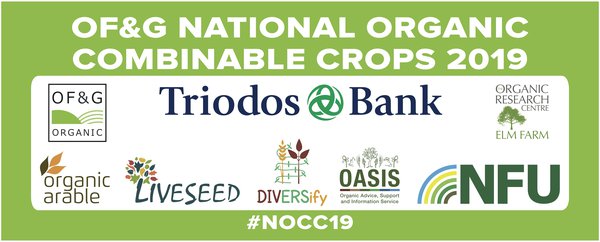
______
This one day event takes three forms. The conference element with delegates seated in a barn converted for the day into a lecture theatre where they can see and hear presentations by key stakeholders.
The second element is the farm walk. Around 200 people attend NOCC each year and we take everyone round the farm to look at key aspects usually including soils, crops and other interesting areas of the host farm. This year the walk took in talks on potatoes and pigs as part of the York Grounds farm tour.
The third element that ties everything together is the food. NOCC catering focuses on organic ingredients that are available in the UK and that are relevant to our audience, combinable crops and associate foods from the organic rotation.
As an event NOCC has not only become a firm fixture in the farming calendar but also for the wider food business community. Bakers and chefs, millers and retailers are all part of the largest organic farm event in the UK.
The Small Food Bakery, from Nottingham won Best Food Producer in the prestigious BBC Food and Farming awards in 2018. Bakery owner Kimberley Bell, coordinates all of the NOCC catering with a small team from the bakery which this year comprised of Ania, Laura and David.
Kim also introduced us to the skills and passion of some of Yorkshire's finest food businesses.
Sarah Lemanski of Noisette Bakehouse in Leeds, Phil Clayton of Haxby Bakehouse in York and Joe Fennerty of Food Circle York are among the most progressive and innovative cooks and bakers in the county.

More detail on the NOCC19 menu towards the foot of this article.
_
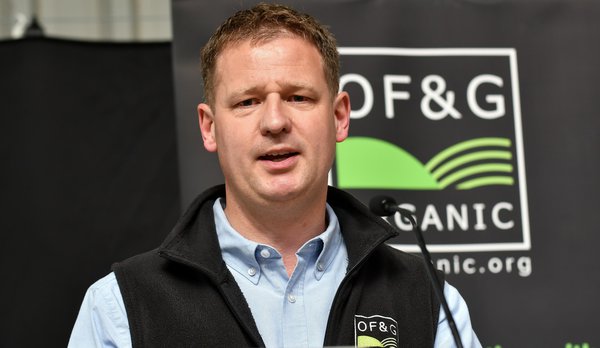
OF&G's head of Certification and Compliance, Stephen Clarkson opened proceedings welcoming delegates and announcing the newly updated OF&G guide for aspiring organic arable farmers -
Organic Arable Farming: Information for farmers considering conversion to organic production -

Host, farmer Richard Thompson, introduces delegates to the 2019 NOCC host farm, York Grounds which is on the Yorkshire Wolds in the east of the county.

“Don’t think that we’re a show farm and we’re going to try and prove to you all how to do it, so any advice, any comments gratefully accepted.”

Aerial view of York Grounds farm from 1952
In 1949 Richard Thompson’s father took the family farm into organic cultivation on his return home after serving ten years in the Indian Police. Michael Thompson came home inspired by Sir Albert Howard's crop variety trials growing on the Indian subcontinent at that time.
Michael decided to forego the ammonium nitrate fertiliser which was growing in popularity at the time. He believed that it would be better for his soils and for his wheats to establish a good fertility build in his crop rotation by encouraging a more connected relationship between the living components of the farm, the soils, the invertebrates and the plantlife.
Today the farm extends to 300 acres and is a mixed operation incorporating pasture, potatoes, pigs, cattle and cereals. The holding also has two wind turbines generating electricity that the farm uses on site, including to power the potato cold store. The farm does still rely on the national grid to supply electricity when wind is not sufficient for demand on site but also to sell excess supply back into the national system.

A wind turbine in the background as NIAB's Dr Elizabeth Stockdale guides a group on soil monitoring
Richard explained how the farm is doing in terms of economic business, "We are a part of the Farm Business Survey and if you’re trying to make a comparison or a judgement as to whether organic farming is sustainable its got to be profitable as well as productive.
The farm business survey figures prove that we’re usually in the top 30% in the mixed or general cropping sample of farms across the north of England."
Richard described his farming approach, “To me the grass and clover is what drives the whole rotation. Get the establishment of the clover right, we’re fixing nitrogen and that is producing the feed, the nitrogen for the following crops.

Clover at York Grounds - picture courtesy of Richard Thompson
"The grass is the feed for the livestock and thats what’s providing the muck which provides the fertility going on for the wheat and the potatoes which are the main cash crops as it were. Investment in the early days into a cold store allowed us to supply through the whole season and gave us a unique selling point in the market. And today a lot of the major supermarkets are looking for UK produce so too with potatoes where UK produce is labelled as such”.
What I can’t easily talk you through is the conversion process because dad started farming organically in 1949 and I’ve grown up with it. But OF&G is a partner to the OASIS information service who will provide conversion advice for farms.
We owe dad a lot for his foresight and his decision then. He was maybe considered a crank by some in East Yorkshire at the time. But talk to any engineer and a crank is very useful.”

Richard Thompson lifting potatoes for the NOCC19 lunch
______
Our conference host for NOCC19 was the broadcaster, journalist and friend of NOCC, Charlotte Smith who again took the reins and steered us through a busy timetable with her usual professionalism and good humour.

Presentations from Dr Ambrogio Costanzo of the Organic Research Centre and the AHDB’s Dr Simon Oxley detailed some of the work being done on breeding for crop varieties that grow well in the low-input situation typical on an organic farm but also that can weather the massive changes to our climate now being observed.

Dr Costanzo’s presentation ‘From variety testing to decision support and systems redesign’ explained steps necessary to move from a basic industrial designed food system to a redesign more suitable for ecological benefit and farm business resilience.
Describing different approaches to pest control Ambrogio described the High Yielding Variety approach much in use over recent decades, is where varieties are bred according to their response to inputs and the environment they are growing in is adapted accordingly.
In contrast an agro-ecological approach such as that favoured on organic farms is where varieties can be tested on the farm as with the ‘Liveseed’ research project were Ambrogio and his team coordinate delivery of seed to all participating farms and lead on monitoring and subsequent follow-up discussions with all the growers individually and in group discussion.
Ambrogio notes that this does appear to work well in building knowledge among farmers and scientists and seed breeders.
He explains this research is field scale and shows how plot scale would not be able to capture such a high level of diverse outcomes. He describes situations where different varieties, tall wheats and short wheats, have different advantages on different farms. This is all depending on soil and machinery and climate as well as varietal choice.
“Yield was closely correlated with cover, negatively correlated to the amount of perennial weeds and, interestingly last year the protein level was negatively correlated to the amount of grass weeds. These are all things that if we can confirm them after a couple of years can start to tell us something true about what happens with weeds”

Ambrogio concluded, “We think that embedding research in the real farming system is redesigning the system. It empowers us and the farmers, it builds capacity, it makes us all work together, it can generate solid evidence and ultimately provides decision support to all farmers not only to the ones involved. After all if we want to change from an input intensive system the real substitution we have to make is going from input intensive to knowledge intensive.”
Dr Simon Oxley described in detail some of the work of AHDB Cereals. He explained how the AHDB WeatherHub can help farmers to look at correlations between weather and diseases, for instance, providing very useful advanced knowledge to growers through data-fed mapping and coordinated observation.
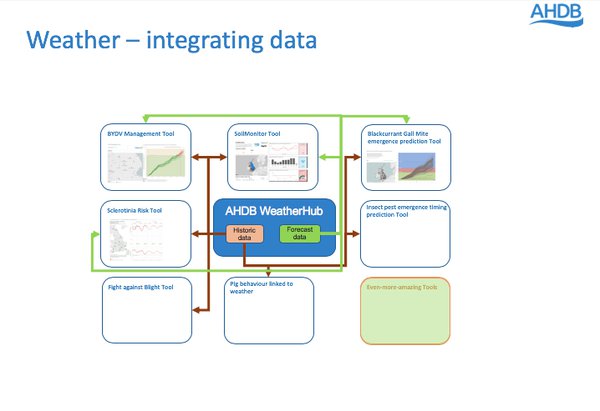
The AHDB monitor farms and the farm bench tool are being widely used by farmers. Simon also spoke about standard protocols and ways to improve not just variety performance in the field but to examine factors that influence resulting product quality in such as flour and baked foods.

Simon explained, “I’m really keen that we push forward because there are lots of innovations in the new varieties and its not necessarily yield its probably either in quality or weed suppression as we see in Ambro’s (Dr Costanzo’s) work.”
After the science presentations the only sole organic focused grain group in the country, Organic Arable, announced their plans to help develop not only their business, now in its twentieth year, but to work even more closely with their own farmers and with trading partners such s those they have forged a trusting and effective relationship with over many years.
Andrew Trump, MD of Organic Arable, described the new sharepoint for their members and research they are funding along with Whites’ who mill Organic Arable oats.
Sophie Alexander, farmer and chair of Organic Arable, then presented a cheque to Dr Costanzo as a tribute from Organic Arable growers to the Organic Research Centre and as a thanks for all the hard work they do and that is providing much needed detail to help growers across the UK.
Sophie said, “Its not hard to explain why countries Denmark, Sweden, Germany, Spain, Italy are ahead of us in percentage of organic land and produce. They have governments that really champion the cause and stand behind them. Whatever hue a UK government is I’m not convinced they’re going to champion organic systems here. We are alone on this, we have to do it ourselves. So, collaboration and cooperation is really what we need to do.”
“In the desire to look for a less commoditised market I joined Organic Arable. They were formed twenty years ago with the express mission to keep the value added premium of organic grain with the farmer with the people who grow it.”
“That is still very much what we set out to do now. Organic grain is our specialist subject we don’t do anything else. Very few farmers, unless they’re directly connected to the retail market have a marketing budget. We rely on everything else to collect and market our grain for us. If we were another business type we would typically allocate 5-10% of our operating costs to marketing.“

Managing director of Organic Arable, Andrew Trump began his presentation by describing the situation in the UK and around the world for organic growers and the organic retail market. In the UK there have been declines in in some areas.
“How do we respond to these declines we see in the UK and not in other member states of the EU and the threat of increasing imported product? We have a young, engaged, ethical consumer out there who really wants to understand not only about the products but also the supply chain that sits behind those products.”
“The way Organic Arable works and is structured really fits with the ethics and desires of these consumers so we must talk to them so they can see that the business model we have is one they would want to support through their consumption.”
Andrew went on to detail some of the new activities that Organic arable are providing for their members including the Check Organic trading platform being trialled with Organic Arable.
And further developments include case studies of farmer members, “We’re developing a set of farmer profiles because people really want to understand who is growing their food, how that’s done and the personalities behind that process”.
-

Sophie Alexander, chair of Organic Arable presents a cheque to Dr Costanzo, the Organic Research Centre
After a break for tea the NOCC Q&A panel included Richard Thompson, Drs Oxley and Costanzo, Andrew Trump, and Sue Walker of Triodos Bank and former NOCC host and OF&G organic farmer, Mark Lea.

The Q&A panel with Sue Walker, Triodos Bank

The Q&A panel with Mark Lea, farmer and NOCC18 host, Green Acres farm, Shropshire
-

Setting off on the NOCC19 farm walk

NOCC19 farm walk - Dr Costanzo discusses wheat breeding
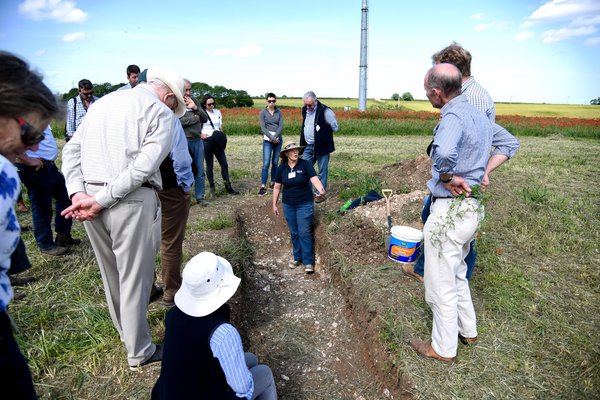
NOCC19 farm walk - Dr Stockdale discusses soil health
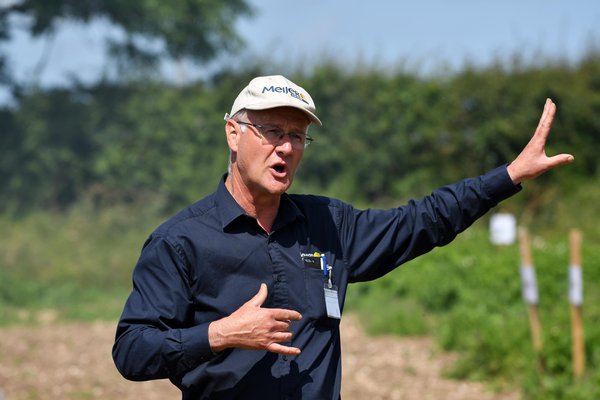
NOCC19 farm walk - Martin Wollerton of Meijer Seed Potato

NOCC19 farm walk - Dr Dickin gives a brief history of wheat breeding
-
Images from OF&G NOCC19 are available via ofgorganic at flickr
And more NOCC photo albums are also available

NOCC19 presentations are available to download -
Organic Research Centre - Dr Ambrogio Costanzo
AHDB - Dr Simon Oxley
Organic Arable - Andrew Trump
Organic Arable Farming: Information for farmers considering conversion to organic production - OF&G
-
NOCC20 will be in Suffolk in early July 2020.
-
OF&G NOCC19 - the Yorkshire menu

On arrival conference delegates were offered a breakfast of local, seasonal organic ingredients
As an event NOCC has not only become a firm fixture in the farming calendar but also for the wider food business community. Bakers and chefs, millers and retailers are all part of the largest organic farm event in the UK.
The Small Food Bakery, from Nottingham won Best Food Producer in the prestigious BBC Food and Farming awards in 2018. Bakery owner Kimberley Bell, coordinates all of the NOCC catering with a small team from the bakery which this year comprised of Ania, Laura and David.
Kim also introduced us to the skills and passion also of some of Yorkshire's finest food businesses.
Sarah Lemanski of Noisette Bakehouse in Leeds, Phil Clayton of Haxby Bakehouse in York and Joe Fennerty of Food Circle York are among the most progressive and innovative cooks and bakers in the county.
The Small Food Bakery, from Nottingham won Best Food Producer in the prestigious BBC Food and Farming awards in 2018. bakery owner Kimberley Bell, coordinates all of the NOCC catering with a small team from the bakery which this year comprised of Ania, Laura and David.
Kim also introduced us to the skills and passion also of some of Yorkshire's finest food businesses.
Sarah Lemanski of Noisette Bakehouse in Leeds, Phil Clayton of Haxby Bakehouse in York and Joe Fennerty of Food Circle York are among the most progressive and innovative cooks and bakers in the county.
Using food from the host farm and from farms nearby the catering team provided a local, seasonal, organic feast.
And their motivation wasn't simply to source locally but also to foster direct trading links between food businesses and farm businesses in the region. The aim is to encourage better business for a long-term sustainable trading relationship.

Kimberley Bell explained the approach taken in catering for NOCC19 -
“We focused on two areas when designing the menu. I wanted us to consider how we might re-value some of our staple crops because I feel that what the commodity markets and the big food system has taken away from us is to convince us to spend a lot of money on what we don’t need and to devalue those very useful crops that nourish us day to day.”
“Potatoes and bread have been really devalued by our supermarket system but they’re incredibly useful and nourishing foods. Barley it occurs to me is not even present in our cuisine in this country but every farm we visited in the last few years seemed to grow a lot of it and I’m wondering about that and so all of those ingredients feature on the menu today.”

L to R - Joe Fennerty, Sarah Lemanski, Phil Clayton
Joe Fennerty described his search for really good quality food from local producers. He explained how it was for him at Food Circle York working toward the menu at NOCC19.
“What I’ve found is that yes, Yorkshire is a huge agricultural region and there is a lot growing and happening, but the food that I’m interested in and I want is in little pockets generally, which is sometimes harder to find but an opportunity like this to bring it all together is something I really enjoyed and hopefully it will show in the food at lunch.”
Owner of Noisette Bakehouse in Leeds, Sarah Lemanski shaped her approach to food from the nature of the ingredients she found -
“I’m driven a lot by flavour and living in Yorkshire my whole life and the things that we can source from the local area have been really important formulating my style of baking and the pastry work that I do.”
Phil Clayton from Haxby Bakehouse in York concluded by describing how the focus on local added up for his food business -
“We found Gilchesters then Yorkshire Organic Millers who were on our doorstep and everything started to slowly make sense. Why would we look far afield where bakers are using flour coming in from Canada and wanting really strong flour to simplify and make the bread baking process easier when 25 miles away we’ve got someone milling their own flour, buying their grain in from the York area, and that makes sense as to why when people are on our doorstep we should be using their products and what they’re growing.”

Catering has grown to put even more of the food from the fields on to the day’s menu
-
OF&G NOCC19 menu
Breakfast by Phil Clayton, Haxby Bakehouse


Breakfast @ NOCC19 - including ‘Marmite’ and cheese spirals and Gooseberry and oat bostock
Bacon brioche ’n’ butter muffins
‘Marmite’ and cheese spirals
Gooseberry and oat bostock
Yorkshire rhubarb danish
Carr House farm apple juice
Yorkshire rhubarb water kefir
Carlin pea coffee
Tea and coffee
-
The Lunch Menu by Food Circle York and Small Food Bakery (Joe, Kim, Ania, Laura, David, Matteo, Mahala, Sarah)

Lunch @ NOCC19 - including Focaccia with lard and green onions to naked barley risotto with turnip tops
- Bread and fat; Focaccia with lard and green onions or mutton fat and rosemary
- YQ wholegrain sourdough
- Fava bean sourdough
- Lard with rosemary
- Beef dripping
- Butter
- Peas and beans with sorrel
- Roasted summer cabbage, yard sauce
- Roasted beetroots and turnips with fennel & popped YQ wheat grains
- YQ pierogi, stuffed with potato, lovage & spring onion dressed with quark and fermented barley
- Baked beans, crispy brisket
- Potato Salad, with rapeseed oil mayonnaise and camellia seeds
- Barley crossbreeds, marrowfat pea humous
- ‘Orzata’ naked barley risotto with turnip tops
- Pudding: rhubarb and custard, YQ praline
Afternoon tea by Sarah Lemanski, Noisette Bakehouse in Leeds
Toasted oat sponge cake with elderflower strawberries, clotted cream
Yorkshire heather honey custard pie with cara potato flaky pastry
Spelt grain pudding with gooseberries, redcurrant and crème fraiche
-

Delegates tucking into the local organic banquet that was the NOCC19 lunch
-
Afternoon tea by Sarah Lemanski, Noisette Bakehouse, Leeds

Toasted oat sponge cake with elderflower, strawberries, clotted cream
Yorkshire heather honey custard pie with cara potato flaky pastry
Spelt grain pudding with gooseberries, redcurrants and crème fraiche
Tea and coffee

-
Farmers and Grower suppliers
- Honey from Stickers & Lovely Strenshall
- Oats and rapeseed oil from Stringers
- Spelt from Gilchesters Organics
- Eggs from Harrys Eggs; butter from Acorn Dairy
- Cream and cheese fro Botton and Stamfrey
- Strawberries, redcurrant and gooseberries from Bentley Grange
- Rhubarb from Allotment Plot 6a
- Radish pods from Pollyfillers
- Dried beans and peas, fermented barley from Hodmedods
- YQ flour and grains; marrowfat peas from Grange Farm
- Carlin peas from Greenacres Farm
- Oak Elliot Naked Barley from Ed Dickin
- Wheat flour from Yorkshire Organic Millers
- Bacon and lard from Grapefruits
- Gooseberries from Balloon tree
- Apple juice from Carr House Farm
- Vegetables and herbs from Newfield Organics, Goodness Growing, Brunswick Organic Nursery and Knapton and Nursery
- Beef from Rosewood Farm
- Potatoes from York Grounds
-
#NOCC19 in the media -
Buoyant market for organic cereals offers opportunities - Farmers Weekly
Increased gross margins for UK organic arable - Farmers Guide
Increased gross margins for UK organic arable - Agronomist & Arable Farmer
Increased gross margins for UK organic arable - Farming online
Organic demand 'higher than ever' and producers are achieving bigger gross margins, conference hears - South West Farmer
The future of organic cereals - NFU insight
